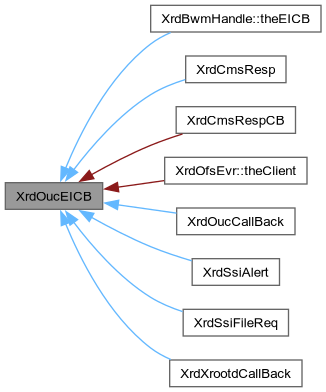#include <XrdOucErrInfo.hh>
Inheritance diagram for XrdOucEICB:

Public Member Functions | |
| virtual void | Done (int &Result, XrdOucErrInfo *eInfo, const char *Path=0)=0 |
| virtual int | Same (unsigned long long arg1, unsigned long long arg2)=0 |
| XrdOucEICB () | |
| Constructor and destructor. | |
| virtual | ~XrdOucEICB () |
Detailed Description
The XrdOucEICB is the object that instantiates a callback. This abstract class is used to define the callback interface. It is normally handled by classes that know how to deal with this object in a user friendly way (e.g. XrdOucCallBack).
Constructor & Destructor Documentation
◆ XrdOucEICB()
|
inline |
Constructor and destructor.
◆ ~XrdOucEICB()
|
inlinevirtual |
Member Function Documentation
◆ Done()
|
pure virtual |
Invoke a callback after an operation completes.
- Parameters
-
Result - the original function's result (may be changed). eInfo - Associated error information. The eInfo object may not be modified until it's own callback Done() method is called, if supplied. If the callback function in eInfo is zero, then the eInfo object is deleted by the invoked callback. Otherwise, that method must be invoked by this callback function after the actual callback message is sent. This allows the callback requestor to do post-processing and be asynchronous being assured that the callback completed. Path - Optionally, the path related to thid request. It is used for tracing and detailed monitoring purposes.
Implemented in XrdSsiAlert, XrdSsiFileReq, XrdBwmHandle::theEICB, XrdCmsRespCB, XrdCmsResp, XrdOfsEvr::theClient, XrdOucCallBack, and XrdXrootdCallBack.
◆ Same()
|
pure virtual |
Determine if two callback arguments refer to the same client.
- Parameters
-
arg1 - The first callback argument. arg2 - The second callback argument.
- Returns
- !0 - The arguments refer to the same client.
- =0 - The arguments refer to the different clients.
Implemented in XrdBwmHandle::theEICB, XrdCmsRespCB, XrdCmsResp, XrdOfsEvr::theClient, XrdOucCallBack, XrdSsiAlert, XrdSsiFileReq, and XrdXrootdCallBack.
The documentation for this class was generated from the following file: